The Hans and Ilse Breuer non-profit Foundation has a lean and unbureaucratic organisation. It consists of two parts: the Executive Board and the Foundation Board of Trustees. The Foundation’s headquarter is in Frankfurt.
The Board of Directors currently consists of one person (according to the articles of association, a maximum of two directors is allowed) and is appointed by the Board of Trustees for five years. The function of this honorary board is to manage the Foundation and its business in accordance with the law, the Foundation’s acts of constitution and guidelines set by the Board of Trustees.
The Board of Trustees of the Hans and Ilse Breuer Foundation consists of six persons. Together with the Executive Board, their purpose is to plan, coordinate and implement the Foundation’s activities, as well as to monitor projects sponsored by the Foundation. All members of the Board of Trustees perform these duties on a voluntary basis.
The Board of Trustees is supported by the Scientific Advisory Board (in short: SAB) in the selection of the scholarship holder and the nomination of candidates for the Alzheimer Research Award. The SAB currently includes six scientists from the fields of basic research, health services research and the industry:
The Board of Directors is supported by an advisory council. The advisory council helps the management to exchange experiences and reflect all strategic decisions, contributes expert knowledge and supports fundraising.
The Executive Board

The foundation has set itself the goal to make dementia less frightening through clarification. Because this enables the affected people and their families to a new living together. This goes hand in hand with long-term research funding. I work hard every day to achieve this.“
Dr. Katja Bär, born in 1967 in Stuttgart-Bad-Cannstatt, studied business administration and earned her doctorate in insurance economics. Miss Dr. Bär has been in charge of the foundation office since 2007. Until the end of 2017, she was a client advisor for wealthy private clients at UBS Europe SE. In addition, she was responsible for the Foundations department and has published numerous articles in the field of German non-profit organizations.
The Board Of Trustees
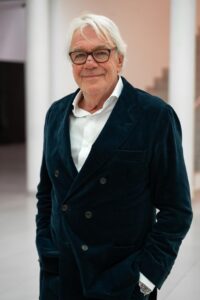
Peter Breuer, chairman of the board of trustees, is the first son of the founder, Hans Breuer, and his wife, Ilse Breuer, and was born in 1948 in Neu-Isenburg. He is married and has one child. Peter Breuer is an independent businessman.
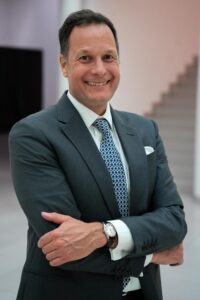
Roland Bergfeld (LL.M.) is admitted attorney in Germany and New York. Born 1971 in Frankfurt, he gradutated at Heidelberg Universtity and Northwestern University. Later he gained extensive experience in consulting various foundations.
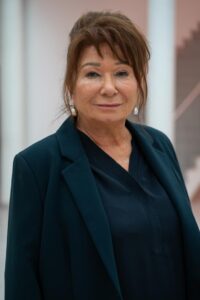
Gabriela Paula Breuer already had a close family relationship with Hans Breuer, the founder of the foundation, and was therefore also involved in Ilse Breuer’s illness. Married to Peter Breuer, she has indirectly been an important source of ideas and advice for the Hans and Ilse Breuer Foundation for many years. She has been an official member of the Board of Trustees since January 2023 and is delighted to have the opportunity to contribute her commitment in an active and advisory capacity.

I have dedicated my life to Alzheimer’s research for 30 years. Only with excellent research, personal initiative and the will to interdisciplinary cooperation will we be able to defeat this scourge of humanity. Despite all our enthusiasm, we should not forget the patients and their relatives in research who rely on help every day. The Hans and Ilse Breuer Foundation supports research, relatives and patients to the same extent. These are the reasons why I am happy to contribute personally and why I am committed.”
Prof. Dr. rer. nat. Dr. h.c. Christian Haass was born in 1960. He studied biology at the University of Heidelberg, where he received his doctorate in 1989. He then went to Harvard Medical School and was appointed Assistant Professor of Neurology in 1992. From 1995 he was head of the Department of Molecular Biology at the Central Institute of Mental Health (ZI) in Mannheim. In 1999, he was appointed Professor of Metabolic Biochemistry at the LMU Munich and head of the Adolf-Butenandt Institute.
In the same year, Prof. Haass initiated the first Germany-wide research network on Alzheimer’s disease with the foundation of the DFG research focus „Cellular Mechanisms of Alzheimer’s Disease“. In 2000 he was spokesman for the DFG Collaborative Research Center „Molecular Mechanisms of Neurodegeneration“. Christian Haass has been honored with numerous awards, including the „International Alois Alzheimer Award“, the „Gottfried Wilhelm Leibniz“ Prize of the DFG, the „Ernst Jung Prize for Medicine“, the „Potamkin“ Prize of the American Academy of Neurology and received the honorary doctorate of the University of Zurich. In January 2014, he received the Federal Cross of Merit on ribbon. His work is now an essential foundation for therapeutic approaches in Alzheimer’s disease. His research focuses on the molecular biology of Alzheimer’s and Parkinson’s disease.
Beiträge mit Prof. Dr. Christian Haass
Genmutation schützt vor Alzheimer – neuer Therapieansatz? (www.fr.de)
Seltene Genmutation könnte vor Alzheimer schützen: Interview Christian Haass, LMU München (Audio, Deutschlandkfunk: 6.32 Minuten)
Rätselhaftes Vergessen – neue Hoffnung bei Alzheimer (www.3sat.de)

Andreas C. Hübner is Senior Managing Director of Lazard Asset Management LLC and is responsible for the business activities of Lazard Asset Management (Deutschland) GmbH with offices in Frankfurt, Hamburg, Milan, Zurich and Geneva. He has been in investment management since 1984. Prior to joining Lazard in 1999, Mr. Hübner was a personally liable partner of SMH Schröder Münchmeyer Hengst & Co., a German private bank, active in both investment banking and asset management.
Mr. Hübner previously worked at UBS Asset Management and DG Bank in New York and Frankfurt. Mr. Hübner is fluent in German and English and has his office in Frankfurt.
He is a member of the Lions Club Frankfurt Eschenheimer Tor, Club of Finance, participant of the BBUG class 105, member of the Städelkomittee Frankfurt, member of the MMK Tischgesellschaft and member of the Atlantikbrücke e.V., Berlin and the Museumsgesellschaft Frankfurt as well as chairman of the Patrons Association of the Städtische Bühnen Frankfurt e.V.

People with dementia and their relatives need our support. Good and innovative science helps to identify causes and risk factors of the disease and to develop new treatment options. The aim of my research is to protect and promote self-determination of those affected by dementia, the participation in social life, physical and mental health and the quality of life through optimal medical, nursing and social care. The Breuer Foundation, with its generous donors and dedicated employees, has been successfully working on these goals for many years and that’s why I am happy to support them.”
Prof. Dr. Wolfgang Hoffmann, MPH, was born in 1963 in Cologne. He heads the Department of Nursing Epidemiology and Community Health of the Institute for Community Medicine at the University Medical Center Greifswald. Prof. Hoffmann is a long-time board member of the German Society for Epidemiology (DGEpi) and a member of the Epidemiological Planning Committee as well as one of the four speakers of the National Cohort.
In addition, he was elected to the board of the Technology and Methodology Platform for Networked Medical Research (TMF) of the Federal Ministry of Education and Research (BMBF) and is also a member of the executive board and a member of the commission „Health Reporting and Health Monitoring“ of the Robert Koch- Institute (RKI), Berlin. Since January 2013 he has been speaker and head of the German Center for Neurodegenerative Diseases (DZNE) in Rostock / Greifswald.
The research focus of Prof. Hoffmann is the development of evidence-based, sustainable, cost-effective treatment pathways for the health and quality of life of people with dementia and their relatives as well as their implementation in the health care system.
Scientific Advisory Board

Daniel Fleck was born in Stuttgart in 1981. He studied biochemistry at the Eberhard Karls University of Tübingen and received his Ph.D 2014 with Prof. Haass and Dr. Willem (Adolf-Butenandt Institute and DZNE in Munich). From 2010 to 2012 Daniel Fleck was holder of the Alzheimer’s Doctoral Scholarship from the Hans and Ilse Breuer Foundation. In 2014 he entered business at Gentech Inc (Department of Neuroscience) in San Francisco. Since 2019 he has been working at Denali Therapeutics Inc. in San Francisco as a biomarker scientist.

”I have dedicated my life to Alzheimer’s research for 30 years. Only with excellent research, personal initiative and the will to interdisciplinary cooperation will we be able to defeat this scourge of humanity. Despite all our enthusiasm, we should not forget the patients and their relatives in research who rely on help every day. The Hans and Ilse Breuer Foundation supports research, relatives and patients to the same extent. These are the reasons why I am happy to contribute personally and why I am committed.”
Prof. Dr. rer. nat. Dr. h.c. Christian Haass was born in 1960. He studied biology at the University of Heidelberg, where he received his doctorate in 1989. He then went to Harvard Medical School and was appointed Assistant Professor of Neurology in 1992. From 1995 he was head of the Department of Molecular Biology at the Central Institute of Mental Health (ZI) in Mannheim. In 1999, he was appointed Professor of Metabolic Biochemistry at the LMU Munich and head of the Adolf-Butenandt Institute.
In the same year, Prof. Haass initiated the first Germany-wide research network on Alzheimer’s disease with the foundation of the DFG research focus „Cellular Mechanisms of Alzheimer’s Disease“. In 2000 he was spokesman for the DFG Collaborative Research Center „Molecular Mechanisms of Neurodegeneration“. Christian Haass has been honored with numerous awards, including the „International Alois Alzheimer Award“, the „Gottfried Wilhelm Leibniz“ Prize of the DFG, the „Ernst Jung Prize for Medicine“, the „Potamkin“ Prize of the American Academy of Neurology and received the honorary doctorate of the University of Zurich. In January 2014, he received the Federal Cross of Merit on ribbon. His work is now an essential foundation for therapeutic approaches in Alzheimer’s disease. His research focuses on the molecular biology of Alzheimer’s and Parkinson’s disease.
Beiträge mit Prof. Dr. Christian Haass
Genmutation schützt vor Alzheimer – neuer Therapieansatz? (www.fr.de)
Seltene Genmutation könnte vor Alzheimer schützen: Interview Christian Haass, LMU München (Audio, Deutschlandkfunk: 6.32 Minuten)
Rätselhaftes Vergessen – neue Hoffnung bei Alzheimer (www.3sat.de)

“I am particularly interested in research into so-called frontotemporal dementia, a special form of dementia that is associated with behavioral and personality disorders and that more often affects younger people. From my contacts with relatives, I am constantly aware of the enormous amount of suffering they are under and how difficult it is for them to get information about the disease and adequate help. I am therefore very pleased and proud to be able to support the excellent work of the Hans and Ilse Breuer Foundation for the benefit of patients and their families. “
Prof. Dr. Manuela Neumann was born in 1969 in Munich. She is Professor of Neuropathology and Medical Director of the Department of Neuropathology at the University Hospital Tübingen and head of the working group „Molecular Neuropathology of Neurodegenerative Diseases“ at the German Center for Neurodegenerative Diseases (DZNE) in Tübingen.
Her research activities focus on neurodegenerative diseases with a special focus on frontotemporal dementia and amyotrophic lateral sclerosis. These activities include amongst other things the management and development of the DZNE Brain Bank. This is a biomaterial bank in which high-quality processed and neuropathologically characterized tissue from deceased persons with neurodegenerative diseases and neurologically healthy people is collected and made available to national and international research institutions for research into neurodegenerative diseases. Manuela Neumann has received numerous awards for her work, including the “Alzheimer’s Research Prize” from the Breuer Foundation and the “Grand Prix Européen de la Recherche” from the French Alzheimer Foundation. She is a member of the German Society for Neuropathology and Neuroanatomy (DGNN), the Professional Association of German Pathologists and the International Society for Frontotemporal Dementias (ISFTD).

Pierluigi Nicotera was born in Catanzaro, Italy in 1956. He studied human medicine at the University of Pavia in Italy, specializing in cardiology. He then did his doctorate at the Karolinksa Institute in Stockholm. There he worked for several years as an associate professor. From 1995 to 2000 he headed the molecular toxicology department at the University of Konstanz and was then appointed director of the toxicology department of the Medical Research Council (MRC) in England. Since 2009 he has been Chairman of the Board and Scientific Director of the DZNE.
Pierluigi Nicotera has been a member of the Academia Europaea since 2005. On July 13, 2016 Pierluigi Nicotera was elected a member of the Leopoldina. He has received numerous awards, including 2013 The Chancellor’s Award Lecture in Neuroscience at LSU Neuroscience Center of Excellence, New Orleans.
Pierluigi Nicotera conducts research in the field of neuronal cell death, i.e. the death of nerve cells caused by the irreversible failure of cell functions. Neuronal cell death is considered to be the cause of numerous diseases of the central nervous system in adult nerve cells. In his research Nicotera focuses on molecular mechanisms that lead to neuronal damage or loss after chronic or acute incidents. This loss of neuronal connections and ultimately the death of neurons through a form of programmed cell death known as apoptosis play a central role in neurodegenerative diseases such as dementia or Parkinson’s disease.

As a young doctor in 1995 I was able to set up a large population-based study on dementia. It was then that I realized what was in store for our aging society. Since then, the topic of dementia has largely determined my scientific work – on risk and protective factors, optimizing care and preventing dementia. The Hans and Ilse Breuer Foundation supports dementia research in an excellent way and, is with the StattHaus, exemplary for new concepts in dementia care. I am committed to the foundation because science and practice really come together there. “
Prof. Dr. med. Steffi G. Riedel-Heller, MPH was born in 1964 in Rodewisch, Germany. She studied human medicine at the University of Leipzig and obtained a Master of Public Health from Johns Hopkins University, Baltimore / USA. She then worked clinically and scientifically and since 2004 has been Professor of Public Health at the Clinic and Polyclinic for Psychiatry at the University of Leipzig. Since 2010 she has headed the Institute for Social Medicine, Occupational Medicine and Public Health (ISAP) at the University of Leipzig. Her research field is epidemiology as well as the prevention and care of cognitive disorders and dementias.

Stacie Weninger is the President of FBRI. Prior to this position, she was the Senior Director of Science Programs for the Fidelity Foundations. In 2005, Dr. Weninger served as the Project Manager and Senior Analyst for the Task Force on Women in Science at Harvard University. From 2001-2005, Dr. Weninger was a Senior Scientist at Cell Press for the journal Neuron. Before joining Cell Press, Dr. Weninger was a postdoctoral research fellow at Children’s Hospital Boston and Harvard Medical School with Dr. Bruce Yankner. She was a Howard Hughes Medical Institute predoctoral fellow in the Program in Neuroscience at Harvard University. While a graduate student and postdoctoral research fellow, Dr. Weninger was actively involved in undergraduate teaching, winning six teaching awards.
Dr. Weninger received a Ph.D. in neuroscience from Harvard University, and a B.S. degree in chemistry with highest honors from the University of North Carolina, Chapel Hill. She currently chairs the Collaboration for Alzheimer’s Prevention; is President of Alzforum; serves as Chairman of the Board of Directors for Rugen Therapeutics; serves as a member of the Board of Directors for Aratome, Atalanta, Eikonizo, RBNC, Sironax, and Target ALS; and serves as a member of the Scientific Advisory Boards for Denali Therapeutics, the Indian Institute of Science’s Centre for Brain Research and the UK Dementia Research Institute. She previously served as a founding member of the Board of Directors for Denali Therapeutics (NASDAQ: DNLI); as well as a member of the Board of Directors for Annexon Biosciences (NASDAQ: ANNX), BRI-Alzan (acquired by MeiraGTx), Digital Cognition Technologies (acquired by Linus Health), Enspectra, Inscopix, Syllable Life Sciences (acquired by RBNC), and Q-State Biosciences.
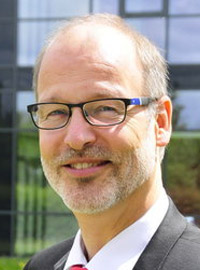
People with dementia and their relatives need our support. Good and innovative science helps to identify causes and risk factors of the disease and to develop new treatment options. The aim of my research is to protect and promote self-determination of those affected by dementia, the participation in social life, physical and mental health and the quality of life through optimal medical, nursing and social care. The Breuer Foundation, with its generous donors and dedicated employees, has been successfully working on these goals for many years and that’s why I am happy to support them.”
Prof. Dr. Wolfgang Hoffmann, MPH, was born in 1963 in Cologne. He heads the Department of Nursing Epidemiology and Community Health of the Institute for Community Medicine at the University Medical Center Greifswald. Prof. Hoffmann is a long-time board member of the German Society for Epidemiology (DGEpi) and a member of the Epidemiological Planning Committee as well as one of the four speakers of the National Cohort.
In addition, he was elected to the board of the Technology and Methodology Platform for Networked Medical Research (TMF) of the Federal Ministry of Education and Research (BMBF) and is also a member of the executive board and a member of the commission „Health Reporting and Health Monitoring“ of the Robert Koch- Institute (RKI), Berlin. Since January 2013 he has been speaker and head of the German Center for Neurodegenerative Diseases (DZNE) in Rostock / Greifswald.
The research focus of Prof. Hoffmann is the development of evidence-based, sustainable, cost-effective treatment pathways for the health and quality of life of people with dementia and their relatives as well as their implementation in the health care system.

Prof. Dr. Dorothee Dormann
Professor of Molecular Cell Biology at JGU Mainz.
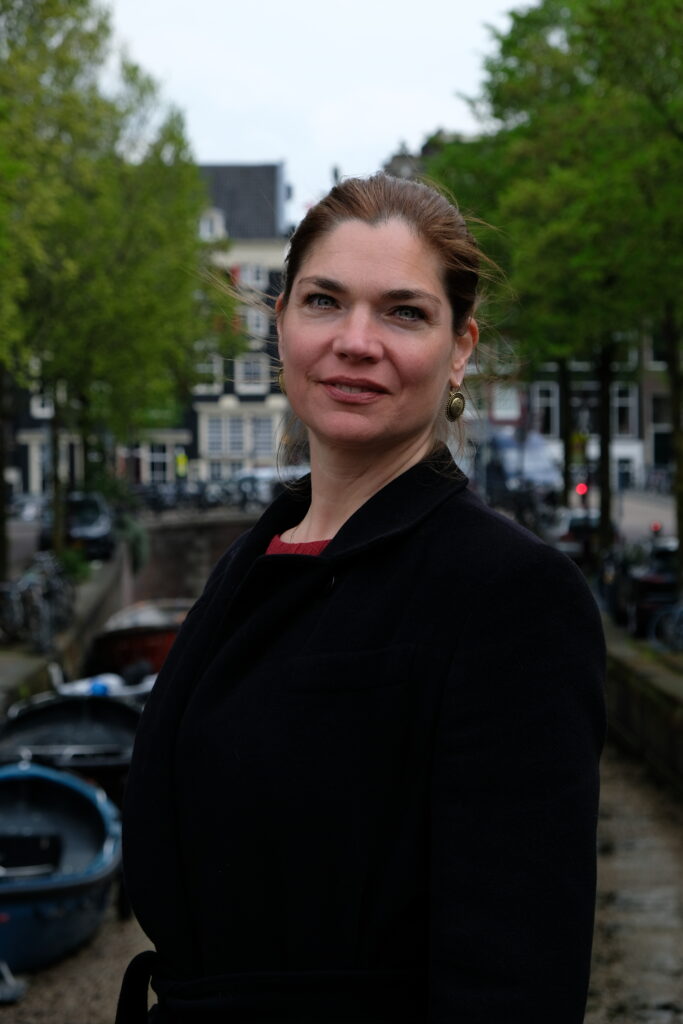
Dr. Henne Holstege
Assistant Professor at the Amsterdam UMC.
